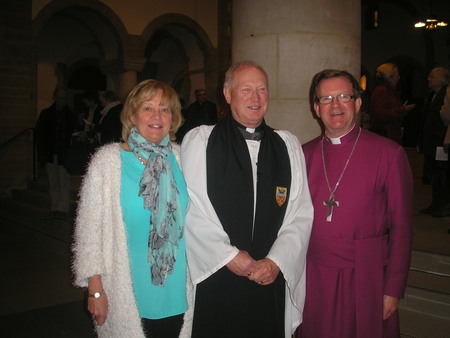In November the Bishop of Portsmouth announced that I am to be installed as an Honorary Canon of Portsmouth Cathedral. The actual ceremony happened on Sunday November 20th in the Cathedral and it was excellent to see St. George’s Church represented by a large number of people and also for them to be welcomed so warmly by the Bishop. The service was called an installation as the Dean literally placed me into one of the Cathedral stalls. To my amazement, the service included some quite formal bits with oaths of allegiance being made to the Queen, to the Bishop and to the Church of England itself. It wasn’t a canonisation, by the way, as that would mean I was dead! New saints are canonised, new canons are installed.
I’ve been both excited and humbled by the whole thing, which was all very unexpected. The Bishop’s phone call was completely out of the blue and to be honest, I didn’t really know what a Canon does, but questions from Church members have forced me to find out. So, what is an Honorary Canon and what does it involve?
The word canon comes from the Greek and simply means a straight rod. In the Church the word came to describe something which couldn’t be bent, or changed, so the Books of the Bible were called the Canon of Scripture. They can’t be changed or added to. The words of Christ at the Eucharist are referred to as the Canon of the Mass because they too can’t be changed. Then there’s Canon Law. Originally there was just “the law” which applied to everyone. Traditionally the Churchwardens were in charge of the village and, as you’ll know if you’ve ever watched Vicar of Dibley, the PCC was responsible for such things as roads and planning. Over the years that’s all changed. Canon Law now describes the rules of the Church, as opposed to Civil Law which is everything else. The meaning is still there, however. Canon Law can’t be changed - at least not without huge difficulty.
As far as titles go, the word Canon was originally used to describe a secular priest – that is he wasn’t also a monk. This gradually changed and Canon became the title of clergy who ministered in a Cathedral rather than in a parish. Those in Cathedrals became known as Residentiary Canons because each clergyman was provided with a house, a residence. These Canons, of which there are four in Portsmouth, have the responsibility for the upkeep of the Cathedral – its finances, its buildings and its worship. The other very formal responsibility that Residentiary Canons have is to approve the Queen’s appointment when a new Bishop is announced.
An Honorary Canon is completely different! It has nothing to do with guarding Scripture or the words in the Eucharist and nothing to do with buildings. To be made an Honorary Canon is in the gift of the Bishop and in Portsmouth there’s an equal number of clerical canons and lay canons - 12 of each. Each Honorary Canon is invited to join the College of Canons which meets twice a year to discuss the Cathedral’s place in the Diocese and its relationship with the parishes.
Thank you for your cards and good wishes on this announcement. I’m delighted to say that although I get to preach in the Cathedral from time to time, I’m not moving to Portsmouth and remain as your Parish Priest in Waterlooville.
Revd. Canon Mike Sheffield





